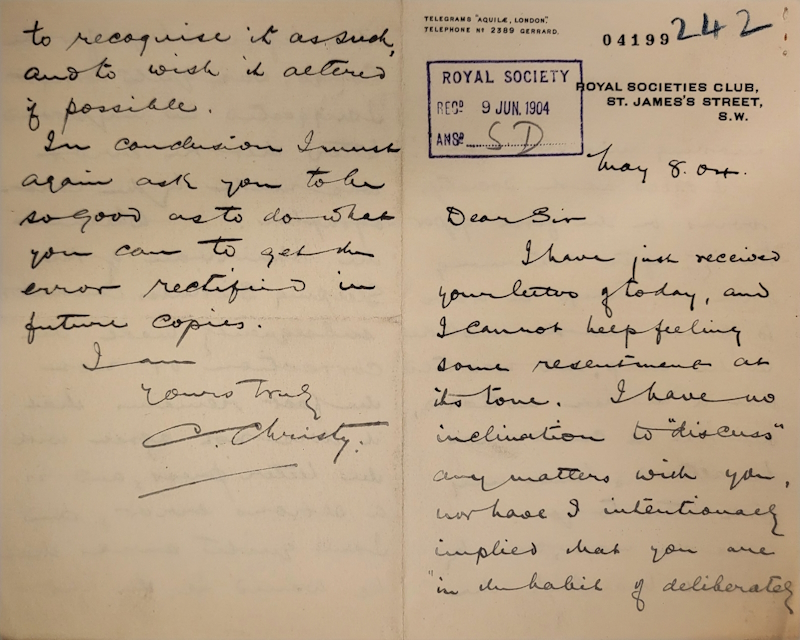Hirra Ateeq discovers offended Fellows and long-running squabbles as she catalogues the Royal Society's Miscellaneous Correspondence.

The Royal Society has always been a focal point for the most brilliant minds in science, research and innovation. However, even the Fellows are not immune to being offended by the slightest inconvenience.
I’m currently cataloguing the Miscellaneous Correspondence (MC) collection, and as the name suggests it’s a mixed bag of everything and anything Fellows, non-Fellows, and officers of the Society discussed in the day-to-day running of the organisation. From the mundane, such as thank-you letters for awards, to high-level collaborations with the Admiralty on naval expeditions, MC does not disappoint. And as a previous cataloguer noted in her ‘Rants and ramblings’ blogpost, it’s not uncommon to come across a series of letters where the correspondent is less than pleased with the treatment they have received.
 Portrait of Frederick Orpen Bower (RS.7788)
Portrait of Frederick Orpen Bower (RS.7788)
There are countless MC letters in which Fellows and non-Fellows alike appear to be working tirelessly to get their papers up to the standard required for publication by the Royal Society. The process to get a paper printed in a publication of the Society could be long and arduous, with the paper historically going to two different referees for their reports. At times corrections, criticisms and suggestions would be returned several times, and the paper went through a series of iterations.
I found one example where a Fellow chose to withdraw his paper rather than making amendments that would ‘greatly weaken’ his argument. Frederick Orpen Bower FRS sent his paper 'Studies in the morphology of spore-producing members. Part. II: Ophioglossaceae', along with a letter suggesting it should be published in the Philosophical Transactions. Six months later Bower, having heard nothing in the interim, enquired about his paper.
A Referee’s Report by William Turner Thiselton-Dyer FRS may explain the delay, as it contained a series of strong criticisms. Thiselton-Dyer wrote that Bower had presented his facts in a ‘repulsive’ way, adding that his paper showed a neglect of 'literary form and proper method' and took an ‘unduly polemical' tone. To balance this, he conceded that when Bower put speculation aside, he was an 'admirable and conscientious worker', and said that his new and important observations rendered the work at least fit for publication in the Society’s Proceedings, if not the Philosophical Transactions.
 MC/16/314
MC/16/314
With this level of scrutiny, it’s no wonder that Bower asked to withdraw his paper, saying that he would rather forego the advantages of publication than present his argument in an 'incomplete and weakened form'. Bower requested his work be sent back to him, but this was against the Royal Society’s policy; the unpublished full paper is available to view on Science in the Making as part of our Archived Papers collection. An abstract did eventually appear in the Proceedings; Bower’s reaction to this is not recorded.
There are plenty of misunderstandings in the MC series. Robert Harrison, Assistant Secretary of the Royal Society, wrote a letter to Ernest Bashford conveying his unhappiness on discovering that Bashford’s paper, intended for the Royal Society, had been published already in the British Medical Journal (BMJ), to which the Society had not sent a copy. Harrison added that he had also prevented The Lancet from publishing the paper, which had in turn ‘understandably irritated’ them, and that its premature appearance in the BMJ made it likely that Bashford’s paper would now be ineligible for publication by the Royal Society.
 Ernest Francis Bashford (Cancer Research UK / Wikimedia Commons)
Ernest Francis Bashford (Cancer Research UK / Wikimedia Commons)
In reply, Bashford remarked that Harrison’s ‘dismay’ could not have been greater than his own, as he had been assured that other journals had been asked not to publish, and he himself had not received the advance proof of his own paper! In his letter Bashford commented how he was ‘aggrieved’ by the extent to which journalists had exploited 'our paper’ and argued that it would be a 'misfortune' if it were to be excluded from the Proceedings of the Royal Society.
 MC/19/47
MC/19/47
The assistant editor of the BMJ clarified that a proof of Bashford’s paper was obtained from a person present at a meeting of the Royal Society, who had openly taken it (with no ‘hindrance’) from a table where there were several copies; perhaps wisely, he refrained from disclosing the name of the guilty party...
 ‘Cuthbert Christy and others on a Sleeping Sickness Commission field study’ (Wellcome Images via Wikimedia Commons)
‘Cuthbert Christy and others on a Sleeping Sickness Commission field study’ (Wellcome Images via Wikimedia Commons)
The misunderstandings don’t end there. Cuthbert Christy, medical officer and zoologist, wrote to Harrison to point out an error made by the cartographers in a map included in his report to the Royal Society Sleeping Sickness Commission; he requested that the mistake be rectified. In his reply Harrison wrote that what Christy described as a 'glaring error' was in fact 'a correction introduced by the Chairman of the Sleeping Sickness Commission’, and therefore under these circumstances he did not feel it was necessary to have the report altered. Christy took great offence at this, saying in his next missive that he felt some 'resentment at [the] tone' of Harrison’s letter and had 'no inclination to discuss matters’. Christy maintained that this was a 'serious error', one he was certain the Chairman would immediately correct.
 MC/19/199
MC/19/199
The archive cataloguing team has been making steady progress with the MC series, and there are now just over 2,000 letters left to catalogue. I’m sure there will be more tiffs and arguments to come before the end!





